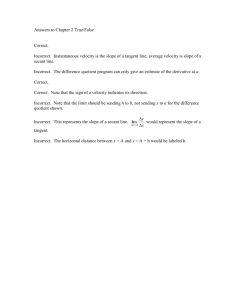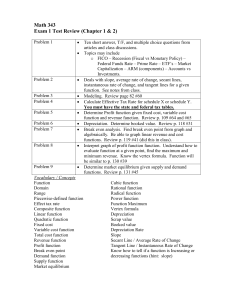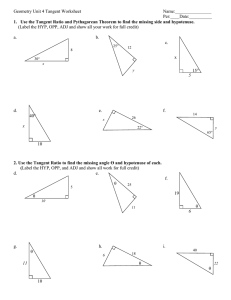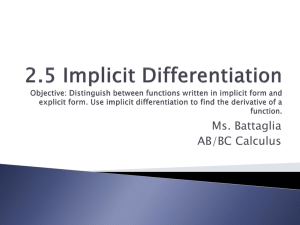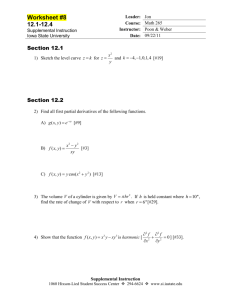1.4
advertisement
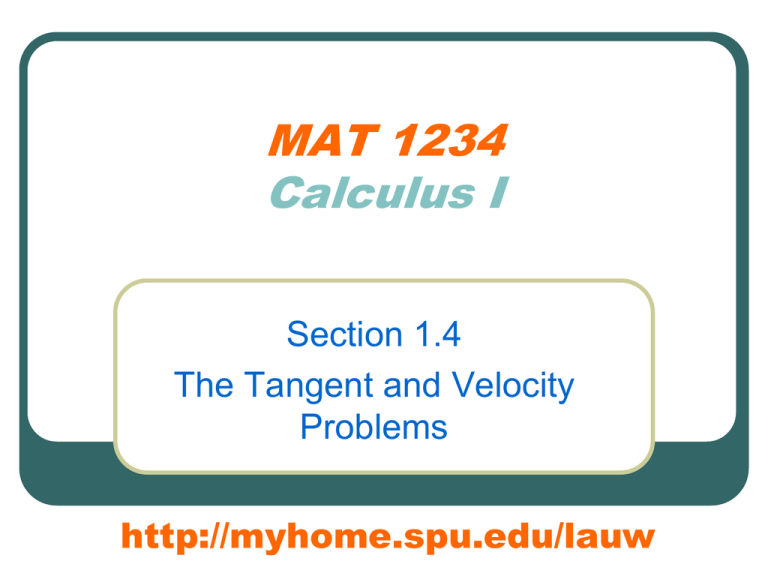
MAT 1234 Calculus I Section 1.4 The Tangent and Velocity Problems http://myhome.spu.edu/lauw WebAssign Homework 1.4 Good News…Only 2 problems… Bad News...No tutoring today (If you need help over the weekend, I posted a HW guide online) Two Worlds and Two Problems The Tangent Problem The Velocity Problem ? Real World Abstract World What do we care? How fast “things” are going • The velocity of a particle • The “speed” of formation of chemicals • The rate of change of a population What is “Rate of Change”? Rate of Change 60 miles/hour at t=40s 30 ml/s at t=5s -30ml/s at t=5s -$5/min at t=8:05am Context What is “Rate of Change”? We are going to look at how to understand and how to find the “rate of change” in terms of functions. The Problems The Tangent Problem The Velocity Problem Example 1 The Tangent Problem Slope=? y y f ( x) 0.5 x 2 1 x 3 Example 1 The Tangent Problem Slope=? y We are going to use an “limiting” process to “find” the slope of the tangent line at x=1. y f ( x) 0.5 x 2 1 x 3 Example 1 The Tangent Problem Slope=? y First we compute the slope of the secant line between x=1 and x=3. y f ( x) 0.5 x 2 1 x 3 Example 1 The Tangent Problem Slope=? y Then we compute the slope of the secant line between x=1 and x=2. y f ( x) 0.5 x 2 1 2 x 3 Example 1 The Tangent Problem Slope=? y As the point on the right hand side of x=1 getting closer and closer to x=1, the slope of the secant line is getting closer and closer to the slope of the tangent line at x=1. y f ( x) 0.5 x 2 1 2 x 3 Example 1 The Tangent Problem Slope=? y First we compute the slope of the secant line between x=1 and x=3. y f ( x) 0.5 x 2 f (3) f (1) f (3) f (1) 3 1 2 0.5 32 0.5 12 2 2 Slope 1 x 3 Example 1 The Tangent Problem Slope=? y First we compute the slope of the secant line (1 h) f (1) between x=1 andfx=3. y f ( x) 0.5 x 2 f (3) f (1) f (3) f (1) 3 1 2 0.5 32 0.5 12 h 2 2 Slope x 1 3 2 Example 1 The Tangent Problem Let us record the results in a table. y f (1 h) f (1) slope h y f ( x) 0.5 x 2 x 1 3 h h 2 1 0.1 0.01 slope 2 Example 1 The Tangent Problem We see from the table that the slope of the tangent line at x=1 should be _________. y y f ( x) 0.5 x 2 x 1 3 h Limit Notations When h is approaching 0, approaching ___. We say as h0, Or, f (1 h) f (1) h f (1 h) f (1) h f (1 h) f (1) lim h 0 h is Definition For the graph of y f ( x) , the slope of the tangent line at x a is f ( a h) f ( a ) lim h 0 h if it exists. Two Worlds and Two Problems The Velocity Problem The Tangent Problem y f ( x) xa f ( a h) f ( a ) lim h 0 h Real World Abstract World Example 2 The Velocity Problem y = distance dropped (ft) t = time (s) 2 Displacement Function y f (t ) 16t (Positive Downward) t 2 Find the velocity of the ball at t=2. Example 2 The Velocity Problem Again, we are going to use the same “limiting” process. t 2 Find the average velocity of the ball from t=2 to t=2+h by the formula t 2h Average velocity distance traveled time elapsed f (2 h) f (2) h f (t ) 16t 2 Example 2 The Velocity Problem t 2 to 3 h 1 t 2 t 2h 2 to 2.1 2 to 2.01 Average Velocity (ft/s) f (3) f (2) 1 0.1 f (2.1) f (2) 0.1 0.01 f (2.01) f (2) 0.01 2 to 2.001 0.001 f (2.001) f (2) 0.001 Example 2 The Velocity Problem We see from the table that velocity of the ball at t=2 should be _________ft/s. t 2 t 2h Limit Notations When h is approaching 0, approaching____. We say as h0, Or, f (2 h) f (2) h f (2 h) f (2) h f (2 h) f (2) lim h 0 h is Definition For the displacement function y f (t ) , the instantaneous velocity at t a is f ( a h) f ( a ) lim h 0 h if it exists. Two Worlds and Two Problems The Velocity Problem t 2 y f (t ) ta lim h 0 f ( a h) f ( a ) h Real World The Tangent Problem y f ( x) xa f ( a h) f ( a ) lim h 0 h Abstract World Review and Preview Example 1 and 2 show that in order to solve the tangent and velocity problems we must be able to find limits. In the next few sections, we will study the methods of computing limits without guessing from tables.

